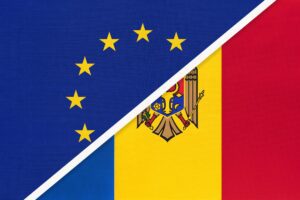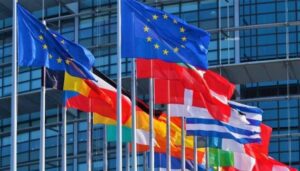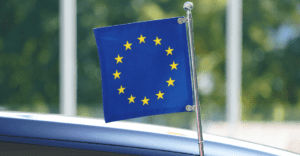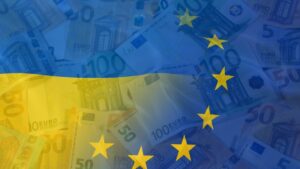
The European Parliament on Tuesday voted to liberalize Moldova’s agricultural exports to the European Union, MEP Siegfried Muresan, who co-chairs the committee for cooperation with Moldova, said.
Under the EP resolution, export quotas will be doubled for a year for seven goods to which tariff quotas still apply. They include tomatoes, garlic, table grapes, apples, cherries, plums, and grape juice. Moldova used to export plums and grapes in large quantities to Ukraine, Belarus and Russia.
The decision was made because the situation in Ukraine “has strongly affected Moldovan farmers, who are no longer able to export their goods to the East,” Muresan said.
The EU is already Moldova’s biggest trading partner, accounting for almost two-thirds of total exports, he said.

The first tranche of EUR1 billion of the new EUR9 billion macro-financial assistance program for Ukraine will be received at the end of July, Executive Vice President of the European Commission Valdis Dombrovskis said.
“In July … by the end of the month,” he told Interfax-Ukraine on the sidelines of the international Ukraine Recovery Conference in Lugano on Monday.
Dombrovskis found it difficult to estimate when and in what volumes the next tranches will be received, noting that work is underway on this issue.
As reported, in June the government managed to significantly increase official external financing, which exceeded $4 billion compared to $1.5 billion in May, with an estimated deficit of $5 billion. According to Finance Minister Serhiy Marchenko, in July the government expects to maintain the same significant volumes of external financing, as in June. In particular, in July, the second tranche for approximately $1.3 billion of a grant from the United States is expected to be received.

JSC Ukrtransgaz, acting as the operator of UGS facilities in Ukraine, has begun preparations for certification for the use of the capacities of its UGS facilities by EU countries, the press service of the company reported on Friday.
“Ukrtransgaz has already begun preparations for passing the independent EU certification introduced for gas storage operators. The company is confident of its successful completion,” it said.
Ukraine, as a member of the Energy Community, is ready to offer up to 10 billion cubic meters of its capacity for gas storage by EU countries.
“There is a corresponding positive and comprehensive experience of cooperation with foreign customers of services. They have already had the opportunity to be convinced of the reliability of gas storage in Ukraine, and they continue to store it today in our facilities,” the press service noted.
In turn, Gas Transmission System Operator of Ukraine (GTSOU) in the course of a joint presentation with Ukrtransgaz at a meeting of the South-East European Gas (SEEGAS) Initiative emphasized that the gas transportation infrastructure and UGS facilities of Ukraine can become the basis for strengthening European and regional energy security already on the eve of the next winter.
According to Olha Belkova, the director for relations with government agencies and international organizations at the GTSOU, in order to further strengthen the energy security of the region of Central and Eastern Europe, Ukraine and partners from Poland, Slovakia, Hungary, Romania, Moldova face the task of strengthening cooperation with countries such as Lithuania, Turkey, Greece and transatlantic partners.
She informed about the interest of Ukrainian traders in gaining access to LNG facilities in Europe. To transport gas to Ukraine from the Lithuanian and Polish LNG terminals, it is necessary to increase the guaranteed capacities on a long-term basis. There is also considerable interest in potential gas supplies from Greece and Turkey via the Trans-Balkan pipeline.

A special agreement on transport liberalization between Ukraine and the European Union will be signed on Wednesday in Lyon, France, as part of the European Commission’s Transport Directorate’s “Connecting Europe Days 2022” meeting, Deputy Minister of Infrastructure of Ukraine Mustafa Nayem said.
“On June 29, Ukraine will finally receive “transport visa-free” with the countries of the European Union,” he wrote on his Facebook page.
Nayem stressed that this event is of great importance for Ukrainian carriers.
“Taking into account the almost five-fold increase in road transport, already in September of this year, due to a lack of auto permits, the export of Ukrainian goods could stop at least in the direction of two neighboring countries. This is hundreds of millions of dollars of losses every month; and more than a billion at the end of the year,” the Deputy Minister gave an example .
According to him, this agreement will also help European consumers to reduce the shortage and increase in prices for Ukrainian goods, as well as many European companies whose offices and production bases continue to operate in Ukraine.

The European Union is starting to supply more than 90 off-road trucks to support the Armed Forces of Ukraine, the EU Delegation to Ukraine has reported.
“The logistics equipment is part of a wider €31 million assistance measure adopted on December 2 in support of Ukraine. The EU has begun supplying the Armed Forces with more than 90 off-road trucks as part of the European Peace Fund. The trucks are provided to support the medical, engineering and logistics units of the Armed Forces of Ukraine “, – said in a press release on the website of the representative office on Tuesday.
It is emphasized that this assistance measure will increase the overall resilience of Ukraine and help strengthen the capacity of its Armed Forces. In particular, we are talking about the provision of medical equipment, including a field hospital, engineering equipment, including demining tools, items for logistics units, including trucks and other means, and equipment to increase cyber defense capabilities.

The EU will allocate 9 billion euros in aid to Ukraine, Polish Prime Minister Mateusz Morawiecki has said.
“This historical moment and the language of today’s conclusions have been rejected for a long time. We have changed this with many countries. Ukraine is at war and has nothing to pay for many public services, so we have approved the allocation of 9 billion euros in aid,” Morawiecki said. on the page of the Office of the Polish Prime Minister on Twitter on Friday.